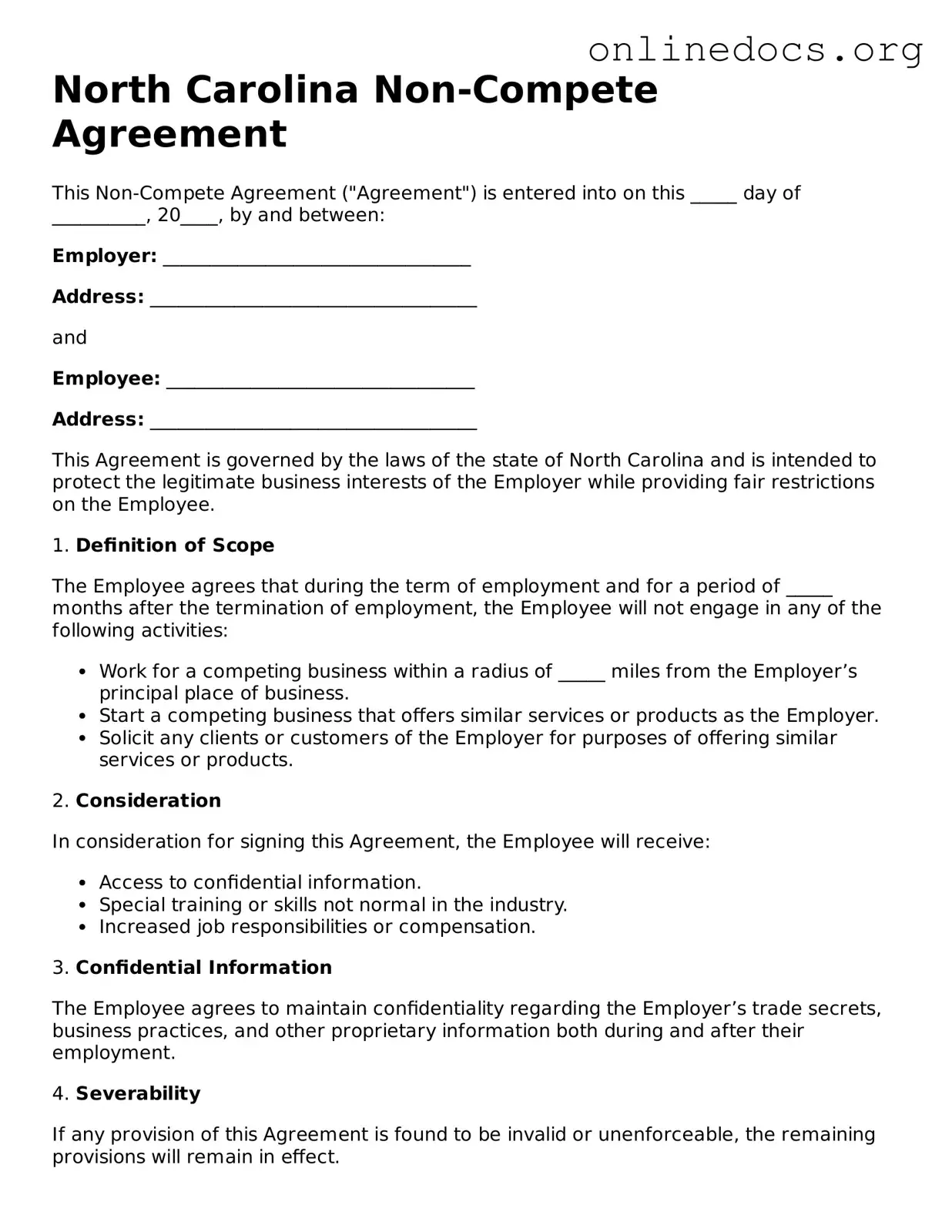The North Carolina Non-compete Agreement shares similarities with the Non-disclosure Agreement (NDA). Both documents aim to protect sensitive information and business interests. While a non-compete restricts an employee from working with competitors after leaving a company, an NDA prevents them from disclosing proprietary information during and after their employment. This ensures that trade secrets and confidential data remain secure, fostering a safe environment for businesses to thrive without the fear of information leaks.
Another document akin to the Non-compete Agreement is the Employment Agreement. This contract outlines the terms of employment, including job responsibilities, compensation, and duration. While the Employment Agreement primarily focuses on the working relationship, it may include a non-compete clause as part of its provisions. This integration emphasizes the importance of both job security and the protection of the employer's interests in a competitive market.
The Confidentiality Agreement also bears resemblance to the Non-compete Agreement. Both documents are designed to safeguard a company’s intellectual property and sensitive information. A Confidentiality Agreement specifically addresses the obligation of employees to keep certain information private, while a Non-compete Agreement restricts their ability to engage in similar work with competitors after their tenure. Together, they create a comprehensive strategy for protecting a business's competitive edge.
The Partnership Agreement is another document that shares characteristics with the Non-compete Agreement. In partnerships, parties often agree to certain restrictions to protect each other's interests. Similar to non-compete clauses, these agreements may include stipulations that prevent partners from engaging in competing businesses during and after the partnership. This ensures that all parties maintain trust and loyalty, which is crucial for a successful business relationship.
The Franchise Agreement is also similar to the Non-compete Agreement. Franchise agreements often include non-compete clauses to protect the franchisor's brand and business model. Franchisees are typically restricted from opening competing businesses within a specified area or time frame after terminating their franchise. This helps maintain the integrity and reputation of the franchise, ensuring that all franchisees adhere to the same standards and practices.
For a more streamlined experience, accessing the Employment Verification form guidelines can greatly assist in the completion process. Please refer to the detailed instructions on the Employment Verification process to enhance your understanding and ensure accuracy.
The Shareholder Agreement can be compared to the Non-compete Agreement as well. This document governs the relationship between shareholders in a corporation and often includes non-compete clauses to prevent shareholders from engaging in competing businesses. By doing so, it protects the corporation's market position and ensures that shareholders remain committed to the company’s success, thereby fostering a collaborative environment.
The Licensing Agreement also has similarities to the Non-compete Agreement. When a business licenses its products or services, it may include non-compete provisions to restrict the licensee from creating similar products or services that could undermine the licensor’s market. This protects the licensor’s intellectual property and ensures that the business can capitalize on its innovations without facing direct competition from its own licensees.
Lastly, the Termination Agreement can be likened to the Non-compete Agreement. When an employee's relationship with a company ends, a Termination Agreement may include non-compete clauses to restrict the former employee from joining competitors for a specified period. This helps protect the company’s interests and ensures that sensitive information is not used against them in the marketplace, maintaining a level of security even after employment has ceased.
